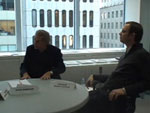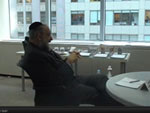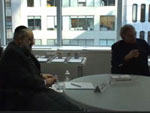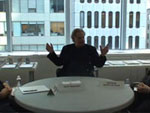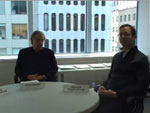David Birnbaum: — and I come up with it, but it turns out I believe it’s not so bad. I mean it’s the best concept to come up with and it turns out not so bad especially since I don’t see Plan B out there. Does that address your point?
Male 1: It does, but that’s all—
David Birnbaum: Okay tell me why.
Male 1: Because you are trying to explain this universe which came into being because this potential was in some way actualized.
David Birnbaum: Yes.
Male 1: Okay. Now the potential is somehow or another infinite, okay. Now if it’s infinite it could have actualized itself in many different ways. That’s the classical definition of God. I mean God could have created whatever He wanted. Now we all agree that God cannot violate certain rules of physics. The reason he can’t violate it was because when he makes step one, he’s stuck with two-three—
David Birnbaum: Agreed.
Male 1: Okay. We all also agree in theoretical sense he doesn’t have to make step one. Now your potential — you see here is what I am getting at. What I am getting at is that when you take a look at theories like the classical theory of evolution — I don’t mean Darwin, that’s out of business now. I mean that’s the theory of evolution today.
David Birnbaum: Right.
Male: Right. It has a problem in that it is deterministic.
David Birnbaum: There are many problems, many problems.
Male 1: But it has a problem, it’s deterministic. So when we try to join it to Judaism, which looks on surface like it’s easy until you hit the determinism problem. So when you hit the determinism problem you start sliding towards Intelligent Design. The problem with Intelligent Design is Intelligent Design assumes a certain physical science, the science of God, and Jews can’t have a physical [cross talk].
David Birnbaum: And that’s the punch line.
Male 1: Okay. So the problem comes as follows that in all of this objection of determinism, now if you can’t allow your potential to theoretically create a world in which you do not need freedom in order to sustain the whole system then you have created a determinism which is not by God.
David Birnbaum: Okay stop.
Male 2: And you–
David Birnbaum: Yes, yes, you are wrong, you are wrong.
Male: From what I understand, there may be two motivations. What you are saying is that freedom, right, you are saying freedom is the kind of condition for the ultimate good.
David Birnbaum: Right.
Male 2: So now I would say two things in your defense. One is that as you acknowledged before this is based on your own understanding of you have to begin with your own experience.
David Birnbaum: Right.
Male 2: Right? I mean there is maybe — there is [inaudible 02:39] but you ultimately have to begin from your understanding of good. Now you can raise the question, well perhaps there is a different understanding of good, okay, but you have to begin from your own understanding.
David Birnbaum: Right.
Male 2: The second point I would say is that maybe you see your view as also in some sense conforming in a kind of very general way to our so-called scientific notions of an expanding universe so maybe you see kind of coherence between that.
Male 1: Well you can take the Big Bang over and over.
[Cross Talk]
David Birnbaum: I feel that there are missing pieces in evolution and there are missing pieces in Jewish theology and I feel that — there are missing pieces in biology and missing pieces in anthropology and there are missing pieces in every science, in metaphysics, in cosmology, etc. and respectfully you will find if you plug this piece into Q4P, Quest for Potential, it does potentially fill out all the missing gaps in all these different areas. It’s a big statement but it happens to work. You name the field and I will show you how it’s [inaudible 03:45] missing pieces including in evolution.
Male 1: Well, we are talking right now about – let’s mention Big Bang in the beginning, the thing which supposedly happens on [inaudible]. So if now we mention this as Big Bang so the problem is once big bang occurs it’s generally assumed by people in the field that everything that happens thereafter has to have been preprogrammed.
David Birnbaum: No, no, no that is incorrect, incorrect, that is incorrect. That’s impossible.
Male 1: [Cross Talk] say this, that’s the way the theory works.
David Birnbaum: The theory [cross talk] because their theory is incomplete as well. I felt the same.
Male 1: I want to join — I want to now join your theory too. So if you say that the Quest for Potential causes this form of explosion that results in the Big Bang, in fact points of view like that underlie all the attempt to unify religious views of the Big Bang. And then when all the religious people jumped up and down with this Big Bang [inaudible 04:43] creation, which is not necessarily clear because Big Bang in itself is dependent on sometimes previous physical entity, right. It’s really truly Aristotle, the world is eternal. Okay. But here is the point I want to ask you about which is that if the potential that is there is what is essentially for all intents and purposes the origin of the divine, using your term.
David Birnbaum: Yes precisely.
Male 1: That potential is actualized in the big bang and the question is this is very technical thing how does that potential avoid becoming determinism. Because it has to–
David Birnbaum: No, no, no. Determinism is a strong word. Potential is wide open. We have to presume that the ultimate potentialities are pretty good in order to have had the traction to contextualize the Big Bang meaning if the ultimate end game is massive holocaust on 3,700 planets I would be dubious that that retroactively had the traction to ignite creation. I have to have the presumption that the ultimate net balance, the ultimate end games are more tilting towards the positive than the negative. Now nothing is deterministic. Nothing is deterministic. Between now and the end of this discussion it’s not deterministic. Any evolutionist or cosmologist who says this is wrong, is in my humble opinion wrong. Only thing that’s deterministic is that things will tend to evolve further. They might evolve from a dead end, they might evolve negatively, they might evolve demonic, but the things will tend to evolve. Why is that? Because if they didn’t tend to evolve we would never have the traction to have Big Bang in the first place. But how would that address your – to some extent address your point? I want you to have a follow up.
Male 1: It does to some extent. I think that the missing ingredient–
David Birnbaum: Right because I can articulate it.
Male: Yeah. The missing ingredient here is this that in order to have any form of God so this, whatever you want to call it, force, whatever because there are certain parallels by the way between you and Kaplan and also Mordecai.
David Birnbaum: Which Kaplan? Just to be sure, just to clear it.
Male: Mordecai Kaplan, and there was Yiddish thinker whose name I don’t remember that I heard about, but also you guys [inaudible 07:23] but this Yiddish wrote similar stuff in ‘20s right before Kaplan, right before Kaplan started, and then also you guys have got [inaudible 07:30] seriously, they were taking it more seriously because Kaplan was struggling with the idea. So he was going to build some kind of religious school. He was a man who was deeply steeped in the Biblical and Jewish tradition and had experience of the Jews and history and he’s trying to explain that when he can to believe in [inaudible 07:48] God. Now in effect, the potential as the divine is very similar to the force that he talks about in the introduction to his history to the religion of Israel which underlies the whole development of the culture and civilization, and that’s very similar.
Now the point is that that [inaudible 08:06] that potential. Now I would say that these guys were still talking about God because they were talking about God [inaudible 08:17] talking about God because they think that if God doesn’t have the long white beard and all that stuff, right, and isn’t throwing plagues on the Egyptians then that’s not God. But of course when you read even the philosophy like [inaudible 08:27] many of these things are not to be taken literally. So the point is they have God and they are looking at God. So that’s the thing. So your potential is God, before he did a lot of stuff, okay that he [inaudible 08:38] before he did a lot of stuff. The question is does he have absolute freedom.
If he has absolute freedom then we have to understand that he would have to — as he actualizes, he has to retain that freedom because except for those aspects of freedom which you correctly say he surrenders because when he does X it brings about Y but that’s still his freedom that he gets, right. So the point is that if he doesn’t have freedom so that gets to this question. Without telling the story for too long, I was talking to a colleague, once an Israeli said, I don’t understand why people can’t explain the holocaust, everybody knows [inaudible 09:15] everybody knows what’s a holocaust and that it created State of Israel. So I asked them a question, I said okay here is a question. Are you going to tell me that all-powerful God wants to create a state for his people and he had to kill six million to give a state, like really? So if anybody wants to give somebody a present they kill [inaudible 09:29] that, right. So he said I never thought of that, I never thought of that.
Now but the point is the notion that any solution to any of these problems will always have [inaudible 09:42] question. The unseen question here still remains from our point of view as people who inhabit this universe, there is no question why you were right that if there is no freedom none of us would be able to achieve the good, there would be no good in the world. It’s not 100% right, I agree with you, but it still doesn’t explain the question why this force of potential which is really essentially [inaudible 10:06] God, he’s got the power to decide how to actualize himself, why didn’t he make a better decision. It’s only for us that good and evil have to pick one another, that’s my point. By the way this is similar to [inaudible 10:22] were mixed up. At the beginning when we got in the first slide they were already mixed up. He separated them. He created the rules for the intersection of good and evil [cross talk] my point about that. He’s just done a better job.
David Birnbaum: Okay. Let’s remember that we’re all brought up with that God of Israel is there and we are here. Okay. And at the risk of [inaudible 10:46] in Book 2 I say we are all part of this great grand divine. It’s not that God is there and we are here. We are all part of it. Just as red blood cell is part of the Milky Way, we are all part of this grand divine. Is there a Godhead which gives [inaudible 11:05] to the Jews of Sinai, maybe yes, maybe no. That’s up to the individual predilection of we are all part of this grand divines and we all connect back to creations, you and I and we all connect to eternity. We all connect to each other somehow and this is the best that we can do. Yes, we would all like the cosmos with no evil but we could never escape from the void with that prerequisite.
Male 1: According to the rules of this world.
David Birnbaum: According to the rules of this universe and I am dealing with this universe, right. These are the ground rules of architecture because in order to divide — in my thesis, just like you split the atom you create a hydrogen bomb or create an atomic bomb, create a hydrogen bomb, you split the zero into positives and negatives and you pray to cosmos, male and female, good and evil, dark and light. So you have to split zero at some point, the ratio, to have a cosmos. You split zero, you end up with negatives and positives. It’s not just Birnbaum, it’s origins of the Cabalistic literature also and many other forms. It’s the best that we could do as part of the grand and infinite divine and ideally there will be no evil but in order to be no evil it has to be like they say you don’t want to have pain, sit in the coffin, no pain in the coffin, but no creation so–
Male 1: [Inaudible 12:37]]
David Birnbaum: So yes, we all like many things, we all like eternal life, we all like children when they get As, like children, we all like many things, but it would seem that the architecture necessary to escape from the void was all deterministic based on that there has to be potential for evil as well. That’s–
For David Birnbaum philosophy, metaphysics, see also Outsider1000
